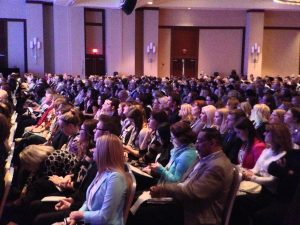By Roberta Attanasio, Forever Leaders Editor
Why are women underrepresented in many science, technology, engineering and mathematics (STEM) fields? Despite much debate, there are not clear answers to this question. In addition, there are not convincing explanations for the so-called “leaky pipeline” effect, which results in a progressively dwindling number of women in STEM from the undergraduate level to the most senior career positions—an effect particularly apparent in academia.
To understand the low representation of women at the senior level in STEM fields, increasing attention has been placed on the role that women play in science-related activities. For example, women are less likely than men to secure prestigious research grants or be the senior author of peer-reviewed articles. A recent study pointed out gender imbalance at scientific conferences, where invited speakers are mostly men.

Photo credit: TopRank Marketing, CC BY 2.0
Now, a new study (published in the journal PLOS ONE on October 16, 2017) highlights that there is gender imbalance even in terms of behavior—at a scientific conference, men asked more questions than women. For this study, scientists compared the question-asking behavior of men and women researchers during 31 sessions across four days at the 2015 International Congress for Conservation Biology. The conference included more than 2000 attendees and had a clear code of conduct, which promoted equality and prohibited any form of discrimination.
The study results show that on average a male researcher asked an estimated 1.8 questions for each 1 question asked by a female researcher. Even among the younger researchers, male participants asked significantly more questions than female participants.
Amy Hinsley, lead author of the study, said in a press release: “Previous research has shown that men are more likely to be invited to speak at conferences, which is likely to lead to them having a higher social reputation than their female peers. If women feel that they are low status, and have suffered discrimination and bias throughout their career then they may be less likely to participate in public discussions, which will in turn affect their scientific reputation. This negative feedback loop can affect women and men, but the evidence in this study suggests that women are affected more.”
Although gender differences in question-asking behavior is a new topic of research, gender differences in “speaking up” and participation in a classroom setting have been thoroughly examined. For example, results from a 2008 study show that women participate less often and with lower confidence in the classroom when compared to men, although they participate more than men in online discussions.
Alison Johnston, senior author of the study, said: “We want our research to inspire conference organizers to encourage participation among all attendees. For example, questions over Twitter or other creative solutions could be tested. Session chairs could also be encouraged to pick participants that represent the gender in the audience. However, these patterns of behavior we observed are only a symptom of the bigger issue. Addressing this alone will not solve the problem. We should continue to research and investigate the underlying causes, so we can implement actions that change the bigger picture for women in science. If we are to level the playing field for women in STEM the complex issue of gender inequality has to stay on the agenda.”
Copyright © 2016-2018 Forever Leaders.




I feel for this topic when it comes to inherent biases and taking notice of discrepancies between the genders we tend to overlook the holistic view. We need to recognize that we are only a few decades removed from the second wave of feminism and therefore we need to stop being surprised when we notice the inherent differences till running between men and women. The way women are taught and learn is still in a heavily dominated male world with the generation after second feminism dropping the ball and allowing the movement to stagnant and therefore future generations of women to suffer and pick up the slack. Women are still pushing past what they see from the media, school, home, and in the public of how a women is ‘supposed’ to act and we’ve been taught to be meek and unassuming and therefore it isn’t surprising that more women don’t speak out and ask questions when in large crowds like those of a science conference. We need to teach women that their voices can’t be heard if they don’t speak up first. I think submitting questions to twitter will help a lot in ways of making women speak up more and help with unintentional biases.
I agree with Samantha because the majority of STEM fields are male-dominated; as a result, there will be more men at these conferences whether they are speakers or attendees. As speakers, women and men need to ensure that they are reaching their entire audience. Additionally, these conferences are usually attended by individuals who know each other. Therefore, when it is time for the Q&A portion, some speakers tend to call on people that they know to elicit a favorable response. Networking and relationship building is integral in helping people develop their voice and making them visible. I feel that female attendees should strive to make connections at these events which will help ensure that their questions are both acknowledged and answered.
Stemming from Vaidehi’s comment, I somewhat disagree with the fact that it is surprising that less women speak up and participate at these event. I do believe that there are a degree of individuals who are more shy and less-forward with speaking, but women today have also been gaining a sense of boost because of how much family and friend cheer each other on! I agree with Vaidehi in the way that the way a girl grow’s up truly signifies her behavior, therefore we should collectively continue to cheer each other on in every way possible. Girls shouuld be brought up in a way that it is important to ask questions if something does not quite make sense, so that we can advance together. I believe that there will be an decrease in women who are rather shy and soft spoken, and there will be an increase in women who can speak their minds, and continue to be curious and ask questions.
I also both agree and disagree with Sam. I like how she thought about the particular speaker and what types of questions wee being asked, because this is often overlooked in studies. A male speaker may be more inclined to call on other males for questions simply due to a male to male relation. Also, women may be less likely to ask questions about a male dominated topic, as Sam pointed out. This reminds me of the recent case of a female report asking a football player a question about a particular play/route. While the question was a perfectly good one, and obviously came from someone who was knowledgable about football, the football player laughed at the woman. Here is where my disagreement arises. In this case, the woman had the courage to ask a very thoughtful question about a male dominated topic, however, she was undermined publicly. This was very embarrassing and upsetting for the woman, and may have a lasting impact on her. While the player received a lot of backlash, this kind of disregard for women often goes unnoticed in the work field. The more it goes unnoticed, the less likely women are to speak up because they believe their questions will not be good enough and they will only end up being publicly belittled. I think this may be one particular cause that is making less women pursue careers in STEM. Like Nancy mentioned, girls are often shut down starting in grade school, where children start to develop their passions. I think there needs to be more encouragement for girls to pursue math and science from teachers and administration throughout a child’s development. I think this may help increase the numbers of women entering STEM careers, and will also boost their confidence as they gain more numbers in a male dominated industry.
This article could not ring more true than for today in my lab. Like Naema mentioned, my PI today in lab confronted me about my writing and how I consistently used passive voice throughout my lab report. She discussed that students and women are far more likely to do this, and create this doubt and uncertainty. She repeatedly stated that I need to own my work, use active voice, and do not be afraid to take responsibility for the work that I have put into our lab. I really liked what Samantha said about how women may not be afraid, but just playing their cards right. I liked the refreshing outlook- it is different form the rest of the comments on here- and it is an interesting take on this study. I agree Samantha that sometimes we look for biases that are not there-which we thoroughly discussed in class a couple weeks ago when discussing the ban on ads with gender stereotypes in England. However, I also disagree, in that regardless of who is speaking or what the atmosphere of the room is, a woman should not hold back her questions out of fear of judgement. Woman or Man, we all have to be able to navigate a room and be able to represent ourselves well if we are to succeed and network efficiently. Nancy and Vaidehi discuss how this rung true for them in their lives. I luckily have never been afraid to ask a question because I am female, or felt that I am dumb because I am female. If I hesitate to ask a question, it is because I do not want to come off stupid-regardless of the genders in the room. I become insecure about asking questions because I question my intelligence and compare it to that of others, men or women. This may have been the issue for many of the women in this study as well- which could affect the results of this study.
I am not surprised to hear that women participate less and ask less questions during STEM Conferences. I can relate to this issue because I myself have a fear of asking questions it’s almost like I am used to not asking questions and I am okay with that. The roots of this fear lie in how girls are brought up. Growing up we are often told not to question and respect authority and we take that teaching at its face value. We need to teach girls that it’s okay to ask questions. The power of asking is real because if we don’t then we are missing out on opportunities that we didn’t even know existed. Like Micheala said “it is our job as the prime generation to be informed about gender biases and respond accordingly”. We are the generation that will bring changes to the current problems that we face.
I understand the previous comments made, but that was not the first question that crossed my mind. I wanted to know the extent of this problem, or was this even a problem? What was the gender of the speaker? If all the speakers were men, maybe the women did not relate and would rather ask their questions to women. What were the quality of asked questions? Did the male-powered questions make the conference of more substance or could they have been left out? From my own personal experience, I feel that women sometimes get counted out or “strikes” for not being as showy and abrupt as men, when in actuality women are just playing their cards right. I think that women are not always “afraid” and lacking in confidence, sometimes they are just uninterested or not moved by the situation. There have been plenty of times where I played a backseat to a man, simply because I did not want to pursue what he was pursuing or did not want to pursue it in his manner. I also question how many men and woman were present. If there was an alarmingly large gap, maybe the conversation was male-driven and favored in ways beyond researches knowledge. In conclusion, I think that women should stop blaming or explaining their reason for “lesser” input, instead they should combat it with the fact that they are capable and just as ambitious as ANY other man.
What a coincidence to read this piece because I just posted a very related article on Twitter (https://www.salon.com/2017/08/30/programs-meant-to-encourage-women-in-stem-may-be-backfiring-because-its-not-women-who-need-to-change/) which discusses the evaluation of Women in STEM initiatives. It talks about a potential backlash of emphasizing the differences that women must make to close the gender gaps. This article perfectly relates because I feel it does not play the “blame game” and instead asks more about “what can we do as a group, as scientists, as people who BELIEVE in equality to close these gaps?” I feel like we are all starting to ask the right questions. We have to stop just telling women “just do it, just believe in yourself and succeed” and figure out the actual causes of the differences. As the article that I posted points out, there are actually decreases in women in some STEM fields. A huge reason of this could be putting the emphasis on the wrong changes. Personal changes in women must be considered but also the changes in our fields. I do believe the only way to find out what changes and initiatives could be effective is to continue to research like the study done at the Biology conference. We have to fully understand our problem before we can tackle it (this goes for the underrepresentation of minorities as well).
I totally agree with your statement. Personal changes in women alone are not enough; There must be changes in the career field as well. In a lot of articles and books that I have read, they tell women to change themselves. “Have more confidence, learn the sacrifices have to be made, and then we have to work two times harder than men.” All of that is true, but what is also true is that the game was Rigged from the start. We must ask ourselves what are some things we can do to decrease these gender specific behaviors in STEM environments.
I also agree that we have to fully understand a problem before we attack it. Right now, many women are being told we have to work two times as hard as man and that is the way that it is, but it doesn’t have to be. We need more people to care about changing the system so that the system can be researched, understood, and bettered.
This article pointed out a critical issue in STEM field majors among women that I am also currently experiencing. In my research lab, our PI insists that we ask questions and critically think about what we are investigating. I noticed if a presenter discusses a topic that is complex, I don’t necessarily try to figure out the details or how it works through questions. I make a note of it and do my own research. However, other male undergraduate students in the lab with me will always jump to asking questions, which is usually the same question I am thinking. I am not really sure why I don’t speak up to ask my question, but because our PI pushes us to ask questions I have slowly began to ask questions. This article resonated with me because I was able to relate to what was being described. Why is this a common theme among women? I think pointing this out to women as an issue will benefit them and prompt them to adapt and change their current stance. It was shocking to see that men were asking roughly twice as many questions compared to women although both had the knowledge and credentials to attend the scientific conference. Women should seek out other women mentors who are able to speak up and ask questions in order to learn from them and develop the skill. My research professor is a women who constantly pushes us to speak up and so far my ability to speak up has increased.
Nancy poses a great question, “why do men as a whole ask almost double the number of questions as women”? This can be answered by what Sheryl Sandberg spoke about in Lean In. Women simply are not used to “sitting at the table”. This can be broadened to mean that women are also not used to standing up and asking questions in a large assembly, something that most men would have no issue doing. Interestingly, it was noted that women participate more in online discussions. Behind the veil of a computer screen, it is simply easier to voice your opinion and ask questions. There is no fear associated with standing in front of your peers and asking questions; thus, explaining the spike in female participation online. I believe that it is our job as the prime generation to be informed of these gender discrepancies and respond accordingly. When women gain the courage to stand in front of their associates, we will see the presenter-gender gap close.
I agree with what Nancy states about confidence especially when you’re just starting out in academic career. Moreover, I think that recognizing that there is an issue with the participation of women at conferences is a first step in fixing the problem. Something in the article that surprised me was that there aren’t many women in senior positions in STEM fields, because I know that in recent years the number of women in STEM fields have increased so it would make sense if the number of women in senior positions to increase but that didn’t happen. I think that asking questions over twitter is a good response to the issue of unequal question asking, because it’s more efficient (the question asker doesn’t have to wait for a microphone to talk) and the questions shown will be chosen at random so no bias from the speaker. Another solution I would like to suggest would be to encourage the speakers to alternate between calling on men and women. This should be a given; however, explicitly stating it might help the outcome of the conference.
In my own life i can certainly see the relevance of the issue discussed in the article to have been a problem. Looking back at grade school i recognize that so often questions as well as comments were more frequently made by my male peers compared to me. This article draws attention to the fact that this phenomenon goes beyond the class and has made its way to STEM confrences. I would like to outright ask the question of why is it that in a side by side comparison, it was found that men as a whole asked almost double the amount of questions of a woman? This is in spite of a discrimination free zone where equality is promoted. One possible explanation can be backed up by research that shows women as overall having a lower self confidence. Perhaps because we have to work twice as hard to prove our selfs in an attempt to overcome the statistics against us. To illustrate my point, a woman goes into the mathmatics field knowing that she is less likely to secure a position as a senior analyst simply because of her gender. This current outlook can seem very daunting, in turn having a negative effect on a woman’s self confidence. That insecurity can understandably translate into a discouragement toward asking questions while amongst men. I believe the article hit on an additional explanation pertaining to womens confidence and a infrequency of answering questions. By inviting more men speakers, the organizations themselves are adding to some women’s feelings of low status. It can be quite difficult to silence those feelings when in the face of a big crowd.